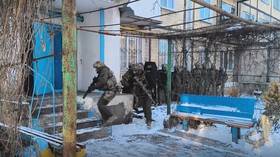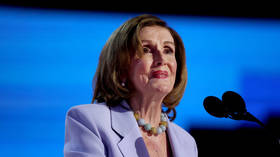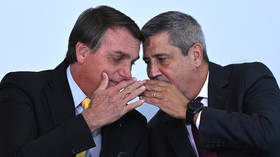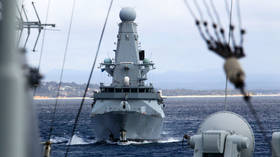Moscow demands end to blockade of Gaza
Russia's Foreign Minister Sergey Lavrov has ended a tour of the Middle East by calling on the international community to support the peace process. He met with Palestinian President Mahmoud Abbas after visiting Israel and Syria.
Human rights organisations say that about 80 per cent of Gaza’s residents are now dependent on food aid while unemployment is close to 40 per cent.
After meeting with Abbas in his Ramallah headquarters on the West Bank, the Russian Foreign Minister called for an end to the Israeli and Egyptian blockades of Gaza.
Lavrov said it is unacceptable and Russia will continue to provide aid to the Palestinian people.
“The blockade of Gaza has become unacceptable and it should be ended as soon as possible, so that the people of Gaza can live normally in the social, economic and other spheres,” Lavrov said.
Lavrov also demanded that Israel halt settlement activity – a demand the Palestinian leadership is also refusing to budge on. It accuses Israel of building illegally on Palestinian soil.
“We are, of course, concerned over Israel's settlement activity. We call for its immediate halt. Russia supports the peace process and Russia will do everything possible both to provide humanitarian and economic aid to Palestinians and to reinforce the efforts of the world community to support the Annapolis process,” Lavrov said.
Lavrov confirmed that Russia is considering the possibility of holding a follow-up meeting to the Annapolis conference held in the U.S. in November.
“Russia will also continue efforts to mobilise the international community to show its support for the agreements reached in Annapolis,” Lavrov said.
President Abbas expressed his support for the initiative, although Israel’s response has been lukewarm.
Passing on a request from President Putin, Lavrov invited Abbas to visit Moscow. The Palestinian leader said he would be glad to and promised to do so in the near future.
Abbas and Lavrov also discussed Palestinian reconciliation talks underway in Yemen. Rival factions Fatah and Hamas have been embroiled in a bitter civil war since Hamas took over Gaza last year after a bloody conflict.
Abbas said he was confident progress would be made in the talks, but was criticised by Hamas for being inconsistent in his position.
“Mahmoud Abbas is confused about it and he keeps going back and forth, but we are serious,” Hamas spokesperson Taher Nunu said.
Middle East tour
The talks with Abbas follow Lavrov’s visits to Israel and Syria.
In Damascus, he met with his counterpart Walid Moallem and Syrian President Bashar al-Assad.
He also met Hamas representatives to discuss the Middle East peace process.
While in Tel Aviv, Lavrov held talks with the Israeli President Shimon Peres and Prime Minister Ehud Olmert, and signed an agreement with his counterpart, which lifts travel restrictions between Russia and Israel.
Kosovo warning
The Foreign Minister has also warned that the supply of U.S. weapons to Kosovo could further destabilise the Balkans. Speaking in Israel, Lavrov said the only legitimate delivery of arms to Kosovo were those made to the international contingent working under a UN mandate.
“The only legitimate basis for regulating the situation in Kosovo is Security Council resolution 1244. It does not allow Kosovo to have its own army or for anybody to supply military equipment to Kosovo except for supplies to the international contingent working under a UN mandate. Any other supplies are illegitimate,” Lavrov said.
He added that he wouldn’t like to think that supplies there are aimed at forcing Serbs and other minorities to remain within the illegally proclaimed state.












